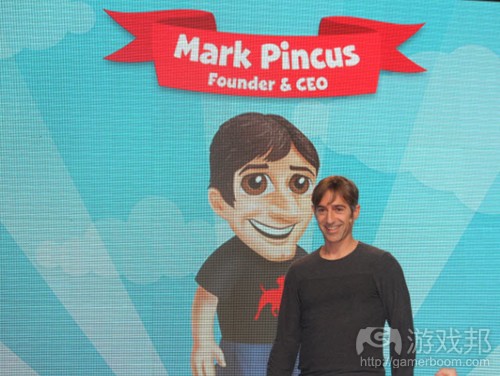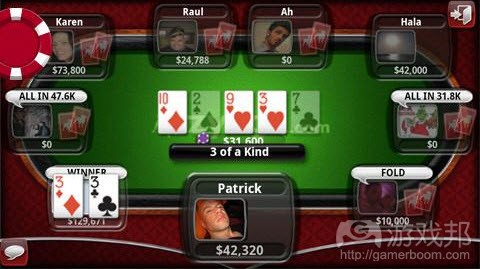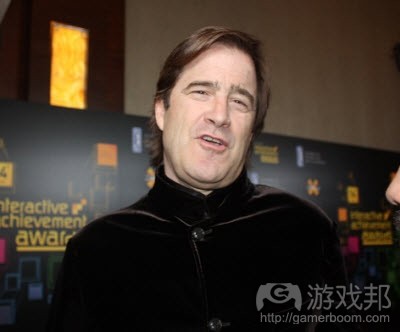回顾社交游戏公司Zynga创业史(一)
作者:Dean Takahashi
在短短的5年时间里,Zynga便在电子游戏领域里掀起了巨大的热潮。即将迎来重要的IPO,这家公司已经成功叙写了游戏历史上辉煌的一篇。
但是,Zynga的成功从来都不是预料之中的结果。事实上,早前大多数游戏产业的资深人士甚至不把它当成一家真正的游戏公司。Zynga创始人Mark Pincus曾经4次创业,但是对于游戏产业他却没有任何经验,并且他之前创办的公司也都不算是大公司。所以,他看起来是最不像能够创造出游戏产业巨头的企业家。(请点击此处阅读第二、第三、第四部分)
而现在,Pincus作为该公司最大的股东,已经是身价不可估量的亿万富翁了。Zynga的数十亿美元IPO以及89亿美元的估值都让这次募股活动无可厚非地成为游戏历史上的一个大事纪,使Zynga步入EA、动视等游戏巨头的行列。
Pincus这位游戏新手幻想着成为游戏产业主导者的同时,他也在创造着可接近大众的社交游戏,正是这种游戏为他创造了成功的可能性。度过重重困难,Zynga已经在社交游戏淘金热潮中打败了许多游戏巨头。从2009年开始,Zynga的游戏已经连续多年蝉联Facebook游戏榜首。截至今天,他在Facebook上仍有5款大受欢迎的游戏。
而单凭Pincus自己的能力是不可能做到这些的。在这期间,他很幸运地遇到了游戏元老Bing Gordon并接受了他的帮助。前Facebook首席运营官Owen Van Natta也在这期间给予了Pincus巨大的帮助。资深游戏设计者,如Mark Skaggs和Brian Reynolds也不断创造出有创意且吸引人的好游戏,帮助该公司洗清其早期因为制作仿制游戏和垃圾邮件游戏落下的坏名声。Zynga能有今天如此杰出的成绩都离不开这些人的帮助,而如此雄雄气势导致其竞争对手,如Playfish和Playdom不得不另辟蹊径,尽快寻找其它能够赚钱的出口。
2007年建立以来,Zynga已经创造了超过15亿美元的收益,这对一家新兴公司来说确实是件了不起的成绩。现在,该公司仍将争取占领虚拟商品市场收益的多数份额,该市场产值已达90亿美元,Zynga预期这一数据今后五年还将翻三倍。
如今,Zynga的目标是成为能与搜索界的谷歌,购物界的亚马逊以及最大分享平台Facebook平起平坐的游戏界之最。Zynga很幸运,它在初始阶段并未拥有多少游戏经验,但在整个发展生涯中,却能不断地向世人证实自己成为一家真正游戏公司的潜质。
本文将从Zynga的早期发展阶段开始说起。Zynga的故事并不只是关于该公司的创办者,还应该包含他身边的各种角色,甚至是激励他争取成功的对手,以及其所面临的各种挑战。我们将从三个方面去讲述Zynga能够获得如此成就的原因以及其中所面临的挫折。
平凡的出生
Pincus在2009年春天的Startup Berkeley上发表了关于创办企业的演讲时曾经说过:“在我成为一名企业家之前我尝试过各种职业。其中更是屡受挫折。就像你想成为一名职业运动员之前,必须先参加少年联盟。在你能够真正应对失败之前你可能会经历无数次的失败……在众多工作中,我被解雇了多次,也有些是我主动向老板提出请辞。”
Pincus开玩笑地说道,最后留给他的选择就只剩下创业了。他曾经读过George Gilder(游戏邦注:当今美国著名未来学家、经济学家,被称为“数字时代的三大思想家之一”)的著作《微观宇宙》,并因此对于这个受技术主导的经济学世界充满兴趣。因此让他萌生了接触新媒体的想法。1995年,携着25万美元的贷款他来到了硅谷,创办了FreeLoader这家网络推动公司。运营7个月后,他将FreeLoader卖给Individual赚得了3800万美元,可以说这是一家见证了Web 1.0时代开端的网络公司。
那时候,其他以数千万美元甚至是上亿价格出售的科技公司并不鲜见,Pincus出售这家公司算不上是什么重磅交易。但不管怎样,这第一家初创企业的成功让Pincus在硅谷的网络浪潮中获得了立足点。随后他便与Cadir Lee和Scott Dale共同创办了Support.com(也就是后来的SupportSoft)这家以提供自动化软件维护和服务的公司。该公司在2000年7月上市。
带着充足的资金,Pincus于2000年1月创办了Tank Hill。但是那时正好碰上了互联网泡沫,所以他和合作者便不得不最终关掉这家公司,并且直到9个月后才弥补了其中的亏损。2003年,37岁的Pincus开办了Tribe.net这家最早的社家网站之一。Pincus将其称之为“Craigslist与Friendster的合体。”但是最终这个网站也未能为其带来较大回报。2005年,在该公司的董事会抛弃了Pincus后,他最终离开了这家公司。但在2006年,他再次从投资者的手上夺回了Tribe.net,并将其资产出售给思科。那时候,Tribe.net只有8名员工,思科在2007年3月完成了这笔收购交易。
他与好友Reid Hoffman(付费平台PayPal的核心成员以及Linkedin的创办者)合作,以70万美元从Sixdegrees手中购买了社交网络的专利权。随后他们便投资于当时还没什么名气的Facebook这家最终开启了Web 2.0潮流,并最先利用动态网络而推动用户在网上进行交流的公司。如此Pincus便与Facebook的创始人Mark Zuckerberg建立起了密切关系,而为他今后所掀起的“社交游戏革命”创造了有利条件。
按照官方的说法,Pincus总共创办了4家公司,但是根据他自己的描述,他已经遭遇过15至20个项目的失败了。但是Pincus确实一个非常成功的天使投资者。他投资的公司包括Napster, eGroups, Technorati, Socialtext, Friendster, Ireit, Nanosolar, Merlin, Naseeb, EZboard, Advent Solar, Xoom以及Facebook。显然,我们在这个列表中却看不到任何游戏公司的身影。
下对了赌注
在创办Zynga之前,Pincus表示自己曾经遭遇了3次惨痛的失败,其中便包括Tribe.net。还有一次失败是来自于名为Tag Sense的广告公司。随后,他总结道:“不要因为有了用户或者赞助者就想着创办公司。如果这只是你的边际想法,你便很难获得好结果。”
Pincus表示,Tag Sense的迅速失败使得他不得不寻找更好的机遇,而2007年5月份,当Facebook开启了应用程序界面并邀请其他公司创造基于该社交网络的应用程序以打败MySpace时,Pincus看到了希望。如此便为Facebook争取到更多用户和开发者,形成了一种良性循环。而Pincus也决定步入这股潮流中。
在Presidio Media(Pincus在2007年4月创办的公司)推动之下,Pincus也赶上了Facebook发展大潮。
在2009年的一次访问中Pincus说道:“在运营Tribe期间,我发现自己真正想做的是关于游戏的事情。我总是说社交游戏就像是一场很棒的鸡尾酒会:一开始你会很开心能够见到好朋友,但是对于鸡尾酒会来说,最大的特色便是没有太大关联度的交际圈。你也会见到一些从未见过的陌生人,或者好友的好友等等。而我所想的,也是你能够做到的便是,一旦你带来了自己的好友,并与其他人的好友聚在一起时,你们便可以一起玩游戏了。我一直非常热衷于玩游戏,但是我却很少有时间与好友们聚在一个地方玩游戏。所以我认为先将好友聚在一起然后再引入游戏是个不错的主意。
2007年7月,Pincus将其新公司重新命名为Zynga(与其斗牛犬同名)。Zynga的首个总部位于旧金山Potrero Hill附近的Chip Factory。
根据自己以往的经验,Pincus认为:“命运是掌握在自己手中。我们总是在谱写着自己的故事,即我们是如何获得成功如何争取到风险投资以及如何创建自己的公司等。以及后来这些成功是如何慢慢远离我们并最终抛弃我们等。这也许是任何人都可能在硅谷所遭遇到的悲剧。而你之所以能够创建一家公司是因为你懂得如何控制这些命运。”他说道,如果自己能够控制公司及其命运,他便达到了一半的目标了。而带着这种想法,他独自创办了Zynga。
Zynga早期的团队成员包括Eric Schiermeyer, Michael Luxton, Justin Waldron, Kyle Stewart, Scott Dale, Steve Schoettler, Kevin Hagan, and Andrew Trader。Pincus对这些成员们的要求很高,但那是因为他真心希望能够创建一家非常优秀的公司。
Zynga的首次成功来自于MySpace,这个平台的社交游戏公司主要通过广告实现收益。虽然Zynga最初的收益来自MySpace,但是Pincus预见到Facebook能够为他们未来的发展提供更广阔的平台。可以说这是一次很明智的赌注,让Zynga能够抓住Facebook这个滑板,朝着更加明亮的未来冲刺着。
当他有了这些想法后,他便时刻提醒自己应该尽所能且快速地验证它们。
Zynga于2007年9月在Facebook发行了第一款游戏。这是一款免费的扑克类社交游戏,之所以选择这类型游戏是因为它不仅简单,而且是一种非常普遍的游戏,好友们无论相距多远都能够一起享受扑克游戏的乐趣。这款游戏的发行重新掀起了扑克游戏的热潮(从2003年以来)。第一款Facebook游戏的成功为Zynga带来了巨大的利润。
Pincus在2009年接受美国知名科技博客网站VentureBeat的访问时说道:“我们是第一家看准了社交游戏机遇的公司,并在2007年7月携带着我们的扑克游戏去追逐这一机遇。当其他人关注于病毒式应用或者病毒式传播内容时,我们只是单纯地瞄准游戏机遇。那时候的我们真心认为这是一种真正且持续的收入来源,所以我们便义无反顾地首先淌进这股潮流中。”
在Zynga的游戏出现之前,免费游戏一直被当成是一些低质量的共享软件。但是现在,它们却是深受众人喜欢的游戏。扑克游戏只能暂时获得一些用户,但是在一开始它们只能够从广告中获得收益。最后,在2008年3月,Zynga便决定通过“引导性销售”贩卖扑克筹码,即让玩家在参加相关广告赞助活动中获取这些筹码。
Pincus在Berkeley发表的演讲中说道“之前我们采取的是大家所熟知的立刻获益的方法。”而在Zynga的第一款Facebook游戏《Texas Hold ‘Em Poker》中他们通过使用扑克筹码间接获益,即让玩家下载了维基工具便能够获得该筹码。
在2008年中旬,Zynga发行了第二款Facebook游戏《Mafia Wars》,以及随后收购的《YoVille》。《Mafia Wars》同时出现在Facebook和MySpace上,因为那时候Zynga还不能判别哪个网站能够最终脱颖而出。
在发行游戏的过程中,Zynga慢慢摸索出了一些独到的观点,并最终成为他们开发游戏的理念。他们认为不论在哪里以及不论何时,游戏都应该具有易用性,社交性和免费特点。游戏必须以数据为设计指导,游戏本身必须是优秀的。说起来这些都是游戏必须获得的崇高目标,但是在这个产业中却甚少有人领悟并尝试实现这一点。
Pincus希望自己能够在寻求风险资本家帮助之前创造出一个真正出色的公司。那时候Zynga刚刚完成了首次融资,在2007年他们只获得69.3万美元的收益,但其用户增长迅速,而且利润已经很可观。结果便是,Pincus因此而获得一些特殊待遇,如掌握比普通股多10倍的投票权,并保持自己在董事会中的权力。
他已经和许多投资者交好,在2008年1月15日宣布已经通过Union Square Ventures, Foundry Group, Avalon Ventures, Reid Hoffman, Peter Thiel等天使投资者融资5百万美元的资金。
获得了新的资金,Zynga便能够更快速地在Facebook这块“乐土”上进行开拓了。Facebook不断调整平台政策,而应用开发者便不得不针对性地更改自己的应用。Pincus称其为“有机开发”,在这个过程中公司的内部开发者不得不时刻关注Facebook的动向,每隔90天左右就要修改自己的产品。
这是一个结合了设计师的直觉和反馈数据,深受参数影响的行业。这使游戏项目能够快速迭代,获取用户,实现留存率与盈利性。这也正是Zynga领先于其他公司的原因:他们了解自己的用户想要什么,并且能够有针对性地快速修改游戏,有时候只要一夜便能为用户提供其所需的内容。Zynga开始验证各种游戏理念。对于Web 2.0公司来说这种做法很平常,但是其他众多游戏公司却没有做到这一点。
关于Zynga深受Facebook政策的影响,这种说法却是个不争的事实。
Pincus开玩笑地说道:“始终围绕着Facebook转悠是不是让我们觉得很苦恼?”“2007年当我们作为一家专门制作Facebook应用的公司时,所有人都在嘲笑我们。那时候我们的生死全都取决于Facebook所作出的任何改变。”
数据也是游戏设计者的天敌。如果一款游戏不会成功,Pincus就会豪不犹豫地取消这个项目。他可以投入3百万美元开发出一款不知名的角色扮演游戏,但如果在游戏发行时并不能获得广泛传播,Pincus便会叫停这个项目。Pincus总是能够果断干脆地处决那些没有市场的游戏。
《Mafia Wars》和《Zynga Poker》取得的好成绩推动了Zynga的快速发展,并帮助他赚得了一大笔利润。而此时的Facebook也处于不断进步状态。
在那时候,发展速度非常关键。但是并非所有人都能够意识到这一点,所以有较高觉悟性的Zynga便毫无悬念地奔走在竞争跑道的最前方,赚取大量的收益。当时只要你知道如何利用社交游戏赚钱并快速执行这一理念,无论后来是否会有巨头公司介入,都能够率先在市场站稳脚跟。
所以在首次融资的几个月后,Zynga便又迅速募集了更大的一笔资金。
在2008年7月,风险投资公司Kleiner Perkins Caufield & Byers向Zynga投入2900万美元的消息引起世界的关注。Bing Gordon,EA前创意总监及现在Kleiner合伙人加入了Zynga的董事会。Mark Pincus真心欢迎这位大牌顾问的加入。
那时候,对于游戏初创公司来说越多资金越有利,但是却很少有游戏公司能够募集到如此高的数额。而Zynga的如此机遇意味着他们可以投入更多的资本去开发下一款大游戏。这是很多竞争者所望尘莫及的,也是为何他们远远落后于Zynga的重要原因。
后来,Pincus总结道,避免失败的一大教训便是待在那些让你有所收获的人群之中。Gordon便是这种良师益友。Pincus拥有Web 2.0的经验,而Gordon比之更了解游戏,他能够让Pincus接触到游戏产业中更多有潜质的人才,而吸引他们到Zynga创造出更多优秀的游戏。如来自EA的资深游戏设计师Mark Skaggs,他在2008年11月以游戏主管的身份加入了Zynga,他将帮助该公司创造出更多更成功的游戏。
Gordon在2010年秋天接受VentureBeat的采访时以Robert Duvall在电影《教父》中的角色为例进行说明:“我只是一个参谋。比起Robert Duvall,我甚至更像是一名招聘人员。但是我非常重视Mark Pincus这个有眼力的合作者。他很巧妙地将网络,游戏和社交结合在一起。这是前所未有的伟大创举。”
Gordon频繁现身于Zynga公司,不断地给予其他员工各种建议,并为该公司带来更多有帮助的人才。
(本文为游戏邦/gamerboom.com编译,拒绝任何不保留版权的转载,如需转载请联系:游戏邦)
How Zynga grew from gaming outcast to $9 billion social game powerhouse
Dean Takahashi
Zynga has turned the video game world upside down in its short five-year history. As it’s poised on the verge of a massive initial public offering, the social game startup is now one of gaming’s great success stories.
But its success was never a foregone conclusion. In fact, most game industry veterans didn’t view it as a real game company. Mark Pincus was a four-time entrepreneur, but had no experience in the game industry and had never managed a big company. He was the most unlikely entrepreneur to create a game industry giant.
Now Pincus is poised to become a multibillionaire as the largest shareholder in a company that is about to hold on Thursday one of the biggest initial public offerings of the year. Zynga’s billion-dollar IPO, at an $8.9 billion valuation, will be one of the biggest events in gaming history and will make it a financial peer to established rivals like Electronic Arts and Activision Blizzard. Through the IPO, Zynga hopes to meet the ambitious goal of investing more “in play than any company in history.”
And it is possible in no small part because Pincus, the gaming novice, dreamed bigger than the game industry when it came to giving users accessible and social games, anytime, anywhere. Against all odds, Zynga has out-competed big gaming brands in the great social game Gold Rush. Zynga games have continuously held the No. 1 ranked spot on Facebook since the beginning of 2009. As of today, it has five of the top five games on Facebook.
Pincus couldn’t have done it on his own. Along the way, he has been helped by the fortuitous friendship of gaming veteran Bing Gordon. Facebook insider Owen Van Natta played a key role at a critical time. And experienced game designers like Mark Skaggs and Brian Reynolds have led the creation of innovative, addictive games, helping the company rise above its early reputation as a creator of cheap knockoffs and a persistent spammer of Facebook news feeds. Together, these people helped Zynga get where it is today, while rivals like Playfish and Playdom decided to take earlier, less lucrative exits.
Since its inception in 2007, Zynga has generated more than $1.5 billion in revenues — a remarkable sum for such a young company. It is now trying to seize the leading share of a $9 billion virtual goods market that it believes could triple in the next five years.
Now the company’s ambition is to become as synonymous with play on the internet as Google is with search, Amazon is with shopping, and Facebook is with sharing. It was lucky that Zynga started out with so little game experience in the beginning. But throughout its life, it would have to prove over and over again that it was a real game company that mattered.
In the following pages, I’ll tell the tale of Zynga from its earliest days. This story is based on extensive interviews and research since 2008. We’ve had limited access to Mark Pincus. In recent months, he hasn’t been giving interviews, due to a quiet period mandated by regulators. But the story of Zynga isn’t just about the founder of the company. It’s also about the whole cast of characters who surrounded him, the rivals who drove him to succeed, and the industry that challenged Zynga to prove itself over and over. We’ve done our best to triangulate on how Zynga became what it is today — and how it almost didn’t happen.
Humble beginnings
“I had a lot of careers before I became an entrepreneur,” Pincus said in a speech about starting companies at Startup Berkeley in the spring of 2009. “And I failed on other people’s money. If you were trying to become a professional athlete, you would want to go through junior leagues first before you started a pro circuit. Fail a lot before you are paying for the failure….I got fired or asked to leave from all my jobs.”
The option that was left for him, Pincus joked, was to become an entrepreneur. He had read George Gilder’s book, Microcosm, and was excited about the economics of the world enabled by technology. That drove him into new media. He eventually made his way to Silicon Valley, starting FreeLoader, a web-based push company, in 1995 with a $250,000 loan. That company was acquired after seven months for $38 million by Individual. It was the start of Web 1.0, or the first giant wave of the first real internet companies.
At the time, other tech companies were selling out for hundreds of millions or even billions of dollars, making Pincus’ exit look almost paltry. Still, his first startup success gave Pincus a full membership in Silicon Valley’s dot-com era. He then founded Support.com (later SupportSoft), a provider of service and support automation software, along with Cadir Lee and Scott Dale. The company went public in July 2000.
Flush with cash, Pincus co-founded his own incubator, Tank Hill in January, 2000. It was just in time for the dot-com crash, and he and his partner shut it down and returned the funds nine months later. In 2003, at the age of 37, he started Tribe.net, one of the first social networks. Pincus thought of it as a “Craigslist meets Friendster.” That didn’t work out so well. Pincus left in 2005, after the board threw him out. In 2006, he took it back over from the investors and sold its assets to Cisco. At the time, Tribe.net had just eight employees, and Cisco completed its purchase by March 2007.
He teamed up with his friend Reid Hoffman, a PayPal veteran and now founder of LinkedIn, to buy a patent on social networking from the defunct Sixdegrees for $700,000. Then they invested in a little company called Facebook, which turned out to be at the beginning of the Web 2.0 wave of companies, or those that were built to take advantage of a newly dynamic web and its growing network of interconnected users. That put Pincus in close touch with Facebook founder Mark Zuckerberg and gave him the inside track to the social media revolution.
Pincus is on record as starting four companies, but he said there were 15 or 20 projects that failed. But Pincus did have a nice touch as an angel investor. His investments included Napster, eGroups, Technorati, Socialtext, Friendster, Ireit, Nanosolar, Merlin, Naseeb, EZboard, Advent Solar, Xoom — and Facebook. Noticeably absent from that list were any game companies.
Making the right bet
To get to Zynga, Pincus said he had three formal failures, including Tribe.net. Another failure was an ad company called Tag Sense. From that, he concluded, “Don’t go start a company just because you have a customer and someone will fund you. If it is a marginal idea, that’s bad.”
Because Tag Sense failed quickly, Pincus said, he was ready when, in the May 2007, Facebook opened up its applications programming interface, inviting other companies to make applications on top of its social network in hopes of beating MySpace. That move helped Facebook gain users as well as developers, creating a virtuous circle. Pincus decided to go along for the ride.
Previously, Pincus had been operating under the name Presidio Media, a company which he formed in April, 2007, as part of an effort to jump on the Facebook bandwagon.
“The whole time I was doing Tribe, I thought the thing I would have loved to do is games,” Pincus said in a 2009 interview:
I’ve always said that social games are like a great cocktail party: You’re happy at first to see your good friends, but the value of the cocktail party is in the weak ties. It’s the people you wouldn’t have thought of meeting; it’s the friends of the friends….What I thought was the ultimate thing you can do — once you bring all of your friends and their friends together — is play games. I’ve always been a closet gamer, but I never have the time and can never get all of my friends together in one place. So the power of my friends already being there and connected, and then adding games, seemed like a big idea.
In July 2007, Pincus changed the name of his new company to Zynga, named after his late bulldog, Zinga. Zynga’s first headquarters were in the Chip Factory in the Potrero Hill neighborhood in San Francisco.
From his previous experiences, Pincus learned, “Control your destiny. We all write this story for ourselves that we were really successful and the evil VC came in and f***** up our company. They backed us and got rid of us and if they had just left us alone. That’s everybody’s sob story in Silicon Valley. You f****** it up because you gave them control of it.” He said he would settle for half the valuation if he could control his company and destiny. As a result of that desire, he funded Zynga himself.
The early team included Eric Schiermeyer, Michael Luxton, Justin Waldron, Kyle Stewart, Scott Dale, Steve Schoettler, Kevin Hagan, and Andrew Trader. Pincus was intense and drove them hard, but he wanted to build a great company.
Its first successes were on MySpace, where other social game companies were making money from ad-based games. Zynga’s early revenue came from MySpace, but Pincus had the smarts to realize that Facebook would win in the future. It was a smart bet that helped Zynga to catch Facebook’s coattails as it went through an unprecedented wave of growth.
As he tried out ideas, he kept in mind that he should test them as cheaply and as quickly as he could.
The company released its first game for Facebook in September 2007. It created a free social poker game on Facebook, chosen because it was simple and it was a universal game that enabled friends to plan a “poker night” with each other no matter if they were far apart or not. Zynga was riding a wave of resurgence that poker had seen since 2003. Zynga’s first game was successful enough to make the company profitable.
“We were the first company to believe in the social gaming opportunity and go after it with our poker game in July, 2007,” Pincus said in an interview with VentureBeat in 2009. “Everybody else was focused on viral apps like pokes and other things that spread more virally. We were always interested in just the gaming opportunity. By the time we saw it was real and had a sustainable revenue stream, we were the first to start investing deeply in it.”
Before Zynga, free games were often viewed as low-quality shareware. But now they were something that millions of people could enjoy. The poker game gained users for a while, but it had no real monetization beyond ads at first. Eventually, in March 2008, Zynga added a way to sell poker chips via “lead generation,” where a user could get chips if they participated in a revenue-generating activity for Zynga, such as accepting an offer to sign up for something.
In a poor choice of words that would eventually come back to haunt him, Pincus later said in his Berkeley speech that “I did every horrible thing in the book to just get revenues right away.” He said that Zynga gave users poker chips in its first game, Texas Hold ‘Em Poker, if they would download a Wiki tool that was difficult or impossible to remove.
In mid-2008, Zynga launched Mafia Wars, its second game, and it acquired another game called YoVille. The Mafia Wars game was available on both Facebook and MySpace, because it wasn’t clear which social network was going to be the winner yet.
In the process of launching its games, Zynga would hit upon some unique ideas that it would later describe as its philosophy. It believed games should be accessible to everyone, anywhere, any time. Games should be social. Games should be free. Games should be data driven. And games should do good. Those were lofty goals, but no one else in the industry believed in trying to make all of those things happen.
Pincus’s intent was to create a real business before he needed to go into a venture capitalist’s office. By the time Zynga raised its first round of money, it had generated only $693,000 in revenue in 2007, but it had a path to growth because its user count was growing fast, and it was already profitable. As a result, Pincus was able to command unusual terms, like giving himself stock that had 10 times the votes of common shares and maintaining control of his board of directors.
He was also able to secure investors that he was already friends with. In a deal announced Jan. 15, 2008, Zynga was able to raise $5 million from Union Square Ventures, Foundry Group, Avalon Ventures, Reid Hoffman, Peter Thiel and other angels.
With the new money, Zynga was able to move even faster at a time when the great Facebook land rush was under way. The social network constantly revamped its platform and app makers had to adjust in real-time. Pincus called this “organic development,” where the company’s own internal developers had to pay close attention to Facebook and redo their work every 90 days or so.
The business would be metric-driven, combining intuition and data. The would enable the business to rapidly iterate and drive reach, retention and revenue. That is exactly how Zynga put distance between itself and others; it learned what users wanted and modified its games quickly, sometimes overnight, to better provide what the users wanted. Zynga started testing every idea. Web 2.0 companies behaved in this fashion, but game companies for the most part didn’t.
But it was true the company forever be at the mercy of the rules that Facebook made.
“Does it bother us that we’re a fly on Facebook’s ass?” Pincus joked in his talk. “In 2007, people laughed at me” for doing a Facebook app company. “We live and die by the changes these guys make.”
Data also could be a game designer’s enemy. If a game didn’t take off, Pincus had no qualms about killing it. He spent $3 million developing an unnamed role-playing game. But the title didn’t take off in a viral way when it launched, so Pincus pulled the plug on it. Pincus became ruthless about canceling games that weren’t working.
Zynga was growing fast thanks to Mafia Wars and Zynga Poker, and it was making money. And Facebook was still growing like crazy.
At the time, the speed was important. Not everyone realized it, but Zynga was in a monumental race to beat others to the treasure. If it learned the most about how to make money from social games and executed the fastest, it would own the market, regardless of whether giant companies came into it later.
So just a few months after its first round, Zynga raised another, larger pile of cash.
In July 2008, the world took notice as Kleiner Perkins Caufield & Byers invested $29 million in Zynga. Bing Gordon (pictured above), the former chief creative officer at Electronic Arts and now a partner at Kleiner, joined Zynga’s board. Mark Pincus welcomed him as a key advisor.
The amount of money was huge for a gaming startup at the time. Few other companies had amassed such a large amount. It meant that Zynga was always going to have a pile of money to invest in its next major titles. That was a luxury that many of its competitors didn’t have, and it was why they fell behind.
Later on, Pincus said that one of the lessons of failure was to surround himself with people that he could learn from. Gordon was such a mentor. While Pincus had the Web 2.0 experience, Gordon knew games. He was able to put Pincus in touch with large number of job candidates in the game industry who were willing to try something new. Some of them, like veteran game designer Mark Skaggs, came from Electronic Arts. He joined as a top game exec at Zynga in November 2008. Skaggs would go on to lead some of the most important games that the company would create.
“I’m a consigliere,” Gordon said in an interview with VentureBeat in the fall of 2010, referring to the Robert Duvall character in The Godfather movie. “I have my own assignments now and then. I have done more recruiting than Robert Duvall. But I have high regard for Mark Pincus as a visionary. He combined the best of the web, games, and social. It never occurred to anyone those would come together.”
Gordon showed up at the company all of the time, lending his advice and bringing in new people as they were needed.(source:venturebeat)










































 闽公网安备35020302001549号
闽公网安备35020302001549号